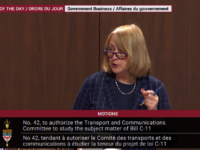Since its introduction in the House of Commons last month, the Online News Act (Bill C-18) has been debated or discussed just once. The bill was tabled without comment by Canadian Heritage Minister Pablo Rodriguez on April 5th. Thus far, Friday, May 13th was the only one day devoted debate on the bill at second reading, a day when so many MPs were not present that there was a question on whether there was sufficient quorum to proceed. Rodriguez did not deliver a speech or answer questions that day, leaving it to his Parliamentary Secretary Chris Bittle, who I pointed out inaccurately characterized the requirement for payments by Internet platforms as “use” of content and implausibly argued that the bill involved “minimal government intervention.” There has been a total of less than two hours of speeches and debate with just 10 MPs speaking to the bill or asking questions (Bittle and Mark Gerretsen being the only Liberal MPs).
 Articles by: Michael Geist
Articles by: Michael Geist
Is the Government Seeking to Short Circuit the Senate Review of Bill C-11?
The review of the Online Streaming Act (Bill C-11) heads to committee next week as the Standing Committee on Canadian Heritage plans to devote roughly 20 hours to hearing over the next two weeks. I have received an invitation and may appear as soon as next week. While the House of Commons committee study is just getting underway, the Senate has been debating the possibility of conducting a “pre-study” of the bill at its own committee. Pre-studies are somewhat unusual since they are conducted before the bill has formally been referred to the committee or, in the case of the Senate, even passed the House of Commons. In fact, Bill C-10, the predecessor to Bill C-11, started with a pre-study which ultimately undermined the overall committee study that many believed was inadequate.
CRTC Chair Confirms Bill C-11 Captures User Content, Will Take Years to Implement
CRTC Chair Ian Scott appeared before the Standing Committee on Canadian Heritage yesterday and Bill C-11 proved to be a popular topic of discussion. The exchanges got testy at times as Scott seemingly stepped outside of his role as an independent regulatory by regularly defending government legislation, even veering into commenting on newspapers, which clearly falls outside the CRTC’s jurisdiction. With respect to Bill C-11, most newsworthy were two comments regarding the regulation of user content and the timelines for implementing the bill if it receives royal assent.
Is There Anything Less Convincing than CRTC Chair Ian Scott’s Empty Assurances on Bill C-11 User Content Regulation?
The Online Streaming Act (Bill C-11) has now passed second reading in the House of Commons and will be the subject of hearings at the Standing Committee on Canadian Heritage in the coming weeks. With the prospect of user generated content regulation still a serious concern, outgoing CRTC Chair Ian Scott tried to provide assurances earlier this week that the Commission has no interest in exercising regulatory powers over user generated content. Yet Scott’s comments rang hollow as he twisted himself in a series of contradictory knots that lead to the inescapable conclusion that non-binding promises without actual reforms mean little.
Digging Into the Government’s Online News Act Claims, Part Two: This is “Minimal Market Intervention”?!
The government has started its defence of Bill C-18, the Online News Act, in the House of Commons with claims that it simply requires compensation for use of news content and adopts a “minimal market intervention” approach. My post yesterday focused on the use claims and this post digs into the bill to see just how minimalist it is. Canadian Heritage Minister Pablo Rodriguez promoted the bill as a market-oriented approach on the day the bill was tabled, leading to an interview with Vassy Kapelos in which she was visibly puzzled at the claim.
Setting aside the fact that many leading Canadian media organizations have already struck news deals with Google and Facebook without government intervention, here is a look at what the government thinks constitutes “minimal market intervention”:











